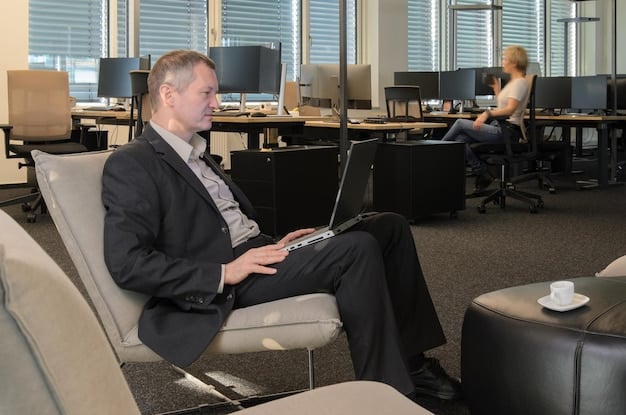Ace Your Interview: Top 10 Questions & Winning Strategies

Ace Your Next Interview: Proven Strategies for Answering the Top 10 Interview Questions provides job seekers with essential techniques and insights to confidently navigate the most common interview questions, enhancing their chances of landing their dream job.
Preparing for a job interview can feel like walking a tightrope. You know your skills, but articulating them under pressure is another story. This guide, Ace Your Next Interview: Proven Strategies for Answering the Top 10 Interview Questions, equips you with the tools and techniques to confidently navigate the interview process and land that dream job.
Understand the Interview Landscape
Before diving into specific questions, it’s crucial to understand the overall purpose of an interview. Recruiters aren’t just looking for qualifications on paper; they want to assess your personality, cultural fit, problem-solving abilities, and how you align with the company’s values. Recognizing this broader context allows you to tailor your responses to showcase not just what you’ve done, but how you approach your work and contribute to a team.
The Employer’s Perspective
Remember, the interviewer is trying to determine if you’re the right fit for both the job and the company. They’re evaluating your skills, experience, and personality to see if you’ll thrive in their environment. Consider what they might be looking for beyond the surface level.
Your Opportunity to Shine
An interview is a two-way street. It’s not just about you answering questions; it’s also your chance to assess if the company is the right fit for you. Prepare thoughtful questions to ask the interviewer, demonstrating your genuine interest and initiative.

Understanding the employer’s perspective allows you to craft responses that directly address their concerns and highlight your strengths in the areas they value most. This section sets the stage for mastering common interview questions.
The Classic “Tell Me About Yourself”
Often the opening question, “Tell me about yourself,” is not an invitation to recite your entire life story. It’s a chance to frame your narrative in a way that aligns with the job requirements. Focus on your relevant experience, key skills, and career aspirations, highlighting what makes you uniquely suited for the role.
- Tailor Your Response: Craft your answer specifically for the job you’re applying for.
- Focus on Achievements: Highlight accomplishments that demonstrate your abilities.
- Keep it Concise: Aim for a response that lasts around two to three minutes.
Avoid These Pitfalls
Steer clear of generic responses or irrelevant personal details. This is a professional setting, so focus on your career-related experiences and skills.
By crafting a compelling and concise response, you can immediately capture the interviewer’s attention and set a positive tone for the rest of the interview.
“What Are Your Strengths?” – Showcase Your Value
When asked about your strengths, don’t just list generic qualities. Instead, choose two or three key strengths that are highly relevant to the job. Provide specific examples of how you’ve demonstrated these strengths in past roles, quantifying your accomplishments whenever possible.
For example, instead of saying “I’m a hard worker,” say “I consistently exceeded my sales targets by 15% each quarter by proactively identifying new leads and building strong client relationships.” This approach provides concrete evidence of your abilities.
- Relevance is Key: Choose strengths that directly align with the job requirements.
- Quantify Your Achievements: Use numbers and data to demonstrate the impact of your strengths.
- Provide Specific Examples: Share stories that illustrate how you’ve used your strengths to achieve results.
Remember, the goal is to convince the interviewer that your strengths are valuable assets that will benefit their organization.
Addressing Weaknesses with Honesty and Positivity
Discussing weaknesses can be tricky, but it’s an opportunity to demonstrate self-awareness and a commitment to growth. Choose a genuine weakness, but frame it in a positive light by highlighting the steps you’re taking to improve. Avoid cliché answers like “I’m a perfectionist.”
Focus on Growth
Instead of dwelling on the negative, emphasize how you’re actively working to overcome your weakness. This shows a proactive attitude and a willingness to learn.

Be Genuine and Authentic
Honesty is important. Choose a weakness that you genuinely recognize in yourself, but ensure it’s not a critical requirement for the job.
By being honest, proactive, and growth-oriented, you can turn a potentially negative question into a positive reflection of your character.
Why Are You Interested in This Role? Demonstrate Enthusiasm
This question is your chance to showcase your genuine interest in the company and the specific role. Research the company thoroughly, understand its mission and values, and articulate why you’re drawn to their culture and the challenges they face. Connect your skills and experience to the company’s goals, demonstrating how you can contribute to their success.
Show genuine enthusiasm for the role and the company. Recruiters want to hire people who are passionate about what they do and believe in the company’s mission.
Where Do You See Yourself in Five Years? Align Your Goals
This question is about understanding your career aspirations and how they align with the company’s long-term goals. Avoid vague answers like “I want to be successful.” Instead, articulate a clear vision for your professional growth and how this role fits into your overall career trajectory.
Show Long-Term Commitment
While it’s important to be ambitious, also demonstrate a desire to grow with the company and contribute to their long-term success.
Be Realistic and Specific
Outline specific skills you hope to develop and the types of responsibilities you aspire to take on within the next five years.
By articulating a clear and realistic vision for your future, you can demonstrate your long-term commitment and alignment with the company’s goals.
“Why Should We Hire You?” The Ultimate Sales Pitch
This is your opportunity to make a compelling case for why you’re the best candidate for the job. Summarize your key strengths, relevant experience, and unique qualifications, highlighting how you can solve the company’s problems and contribute to their success. Tailor your answer to the specific needs of the role and the company.
- Highlight Your Unique Value Proposition: What makes you stand out from other candidates?
- Address the Company’s Needs: Demonstrate how you can solve their specific challenges.
- Summarize Your Key Qualifications: Reinforce your most relevant skills and experiences.
This is your closing argument. Make it count.
“Do You Have Any Questions?” Prepare Thoughtful Inquiries
Always have a few questions prepared to ask the interviewer. This demonstrates your genuine interest and engagement. Ask questions about the company culture, the team dynamics, or the specific challenges of the role. Avoid asking questions that can easily be answered by a quick Google search.
This is your chance to gather more information about the company and determine if it’s the right fit for you.
Negotiating Salary and Benefits
While it’s important to be professional and enthusiastic throughout the interview process, it’s also essential to be prepared to discuss salary and benefits. Research industry standards for similar roles in your location. Be confident in your worth and understand your bottom line before entering the negotiation. Be polite but firm in advocating for your needs.
Remember, negotiating is a skill. Practice with a friend or mentor to refine your approach and build your confidence.
By mastering these top 10 interview questions and strategies you will demonstrate that you are ready to ace your next interview and land your dream job.
| Key Takeaway | Brief Description |
|---|---|
| 💡 Tailor Answers | Customize responses to match the job’s requirements, showcasing relevant skills. |
| 💪 Highlight Strengths | Emphasize key strengths with specific, quantified examples. |
| 🎯 Align Goals | Show how your career aspirations align with the company’s long-term vision. |
| ❓ Prepare Questions | Engage the interviewer by asking thoughtful and relevant questions. |
[Frequently Asked Questions]
▼
Research the company thoroughly, practice answering common interview questions, and prepare a few insightful questions to ask the interviewer. Knowing the company’s mission will make it easier to show enthusiasm.
▼
Choose a real weakness, but focus on what you’re doing to improve it. Frame it positively to show self-awareness and a commitment to growth. Always turn it into a positive.
▼
It’s generally best to avoid discussing salary in detail during the initial interview. Focus on showcasing your value and learning more about the role. You should discuss salary later on in the interview process.
▼
Dress professionally, but also consider the company culture. When in doubt, it’s always better to lean towards being slightly overdressed than underdressed. Ensuring that you are well covered is ideal.
▼
Sending a thank-you note is crucial. It demonstrates your professionalism and appreciation for the interviewer’s time. It should be sent within 24 hours and can be an e-mail as well.
Conclusion
Mastering the art of answering common interview questions is a crucial step towards career success. By understanding the interviewer’s perspective, preparing thoughtful responses, and showcasing your unique value, you can confidently navigate the interview process and land your dream job.





